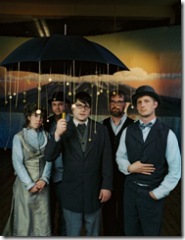Voldemort vs Sauron, who would win?
 I’ve just recently picked up my copy of the seventh Harry Potter book and secreted it beneath a stack of Playboys. I take it out occasionally and read it in the bathroom so Mrs. Ziffer won’t know what I’m up to. For me, reading the adventures of the boy wizard is a secret vice — as all vices should be.
I’ve just recently picked up my copy of the seventh Harry Potter book and secreted it beneath a stack of Playboys. I take it out occasionally and read it in the bathroom so Mrs. Ziffer won’t know what I’m up to. For me, reading the adventures of the boy wizard is a secret vice — as all vices should be.
In the 60’s the U.S. had the Arthurian cycle — or at least the musical version of it — to serve as the prism through which its citizens interpreted the political world. During the American Civil War, A Thousand and One Arabian Nights served much the same purpose. During the American Revolutionary War, political leaders were guided by the Roman historians and able to quote Thucydides. More recently, neoconservatives have attempted to revive interest in Thucydides as a template for forming political narratives, but facts on the ground have tended to discredit this project. And in its place, we instead have … what?
The Dark Lord Sauron commands an army of tens of thousands, including the Nazgul and their witch-king. He manifests himself as a far-seeing eye, and the mere mention of his name by the unwary draws his attention. He can corrupt the souls of men. In battle he drives his enemies before him with a wave of his hand.
The Dark Lord Voldemort commands followers who disrupt sports matches, ripping up tents and setting off fireworks. He uses three forbidden spells, the most powerful of which is a death spell that works when he is near his victim. It works something like a self-reloading pistol. It is not clear whether it can penetrate decent armor like kevlar or mithril. Chances are that it cannot, since even common furniture has been known to deflect it. It is also not a spell peculiar to him — he just seems more willing than most to use it.
In a no-holds-barred battle between the two, I’m not sure how Voldemort stands any chance.

Examining their respective nemeses only seems to muddy the waters further. Frodo is armed with a magic dagger that detects the proximity of goblins and orcs. With his short reach, however, it is only effective in close-quarters fighting, and Harry prefers to cast spells at a distance. Frodo is also protected by a mithril coat of mail, an elven cloak, and the vial of Galadrial, which may grant him enough protection to close the distance between himself and Harry and put his dagger to use. He prefers to use these defenses to flee from enemies, however, and appears to lack the martial skills to use his powerful defensive weapons effectively to overcome young Harry. Again, the odds seem overwhelmingly to favor one combatant over the other. A Patronum, Expelliarmus and Rictusempra spell should quickly bring Frodo to his knees.
Despite the fact that Frodo can be easily defeated by Harry, who is presented as a close match for Voldemort, who in turn is clearly out of the Dark Lord Sauron’s league, Sauron is ultimately defeated by the halfling, who by the transitive principle should be the weakest of them all. How is this possible?
According to Jean-Francois Lyotard, this is an instance of a differend:
As distinguished from a litigation, a differend would be a case of conflict, between (at least) two parties, that cannot be equitably resolved for lack of a rule of judgment applicable to both arguments. One side’s legitimacy does not imply the other’s lack of legitimacy. However applying a single rule of judgment to both in order to settle their differend as though it were merely a litigation would wrong (at least) one of them (and both of them if neither side admits this rule).
While on their surface, both Harry Potter and The Lord of the Rings belong to the same narrative genre, the paradox above reveals that they in fact belong to different genres. The regimens which determine the outcome of conflicts in these two series are incompatible, even though they co-exist and confirm a similar theme — good must overcome evil. To apply the narrative rules of one to the other would confound this theme, and cause evil to overcome good. In Harry’s world, Frodo would quickly be destroyed by the Avada Kadavra (he has neither magic nor the charm of a mother’s love, as far as we know), while in Frodo’s world, Harry would succumb to the power of the ring or simply be overcome by hordes of uruk-hai.
 The rules by which Harry is able to overcome Voldemort (I don’t mean to give away the ending — let us assume that this is where the story is clearly headed), and Frodo to defeat Sauron, are derived from two very ancient narratives about the nature of the conflict between Good and Evil.
The rules by which Harry is able to overcome Voldemort (I don’t mean to give away the ending — let us assume that this is where the story is clearly headed), and Frodo to defeat Sauron, are derived from two very ancient narratives about the nature of the conflict between Good and Evil.
According to one, good and evil are cosmic forces in conflict. They are equal in power. Ultimately good is intended to triumph, though this also entails many victories for the forces of evil along the way. How goodness can triumph, when it is a power equal to the power of evil, is an open question.
According to the other, as enunciated by Plato, evil is a privation. There is only The Good, while evil is simply a way of talking about distance from this Ideal. Evil is nothing in itself; evil is the absence of goodness.
Christianity, while having officially adopted the latter cosmology, has in fact always vacillated between these two notions. During times of little struggle, the Platonic viewpoint has tended to hold sway. In times of trouble, however, the tendency to reify evil predominates, and in its wake Manichean cosmology holds sway.
The peculiarity of The Lord of the Rings lies in the placement of a Platonic regime within a Manichean narrative, and that the confirmation of this does not reveal itself until the end. The struggle between good and evil in Middle-Earth is stark. The good are so very good, while the bad are so clearly evil. The corruption of men, when it occurs with Lord Denethor and Saruman, is rarely subtle. The redemption of King Theoden and Baromir, and the near-redemption of Gollum, are central moments in the story, and in each case is caused by the forces of light — by Gandalf, Merry and Pippin, and Frodo, respectively — as if redemption were a force which these characters emanated from their very being.
The progress of the novel involves the Fellowship of the Ring moving through Middle-Earth and recruiting allies to a cause that is sure to fail. The overwhelming power of the Dark Lord Sauron is always clear, so in what lies their hope? How does a hobbit resist and defeat such an evil will? This is only possible if the rules of conflict are Platonic rather than Manichean. Sauron is everything that Frodo is not. More accurately, Frodo is everything that Sauron is not, and he proves this by resisting the lure of the ring. In the Lord of the Rings, all it takes to defeat evil is to deny evil any power.
 In the Harry Potter novels, the reverse is the case. What is required to defeat evil, in this narrative regime, is to recognize that Evil exists and to apply a more powerful force against it. Harry recruits allies not to deny those allies to the Dark Lord. Rather, he recruits allies in order to gather power — good power of course — that will be sufficient to overcome Voldemort’s reserves of evil force. Moreover, unlike in Tolkien’s work, the powers involved are not based on disproportion, but rather on the similarlity in power between Voldemort and Harry, who carries part of Voldemort’s power in his famous scar. The series builds, surely and inevitably, toward a final showdown (again, I don’t mean to give away the ending — let us merely agree that we understand the narrative rules upon which Harry Potter is built, the same rules upon which Star Wars is built, in fact, and go on from there) in which Harry must use this stolen power to defeat the powers of darkness — so unlike the burden of Frodo, who must carry Sauron’s power and refuse to use it.
In the Harry Potter novels, the reverse is the case. What is required to defeat evil, in this narrative regime, is to recognize that Evil exists and to apply a more powerful force against it. Harry recruits allies not to deny those allies to the Dark Lord. Rather, he recruits allies in order to gather power — good power of course — that will be sufficient to overcome Voldemort’s reserves of evil force. Moreover, unlike in Tolkien’s work, the powers involved are not based on disproportion, but rather on the similarlity in power between Voldemort and Harry, who carries part of Voldemort’s power in his famous scar. The series builds, surely and inevitably, toward a final showdown (again, I don’t mean to give away the ending — let us merely agree that we understand the narrative rules upon which Harry Potter is built, the same rules upon which Star Wars is built, in fact, and go on from there) in which Harry must use this stolen power to defeat the powers of darkness — so unlike the burden of Frodo, who must carry Sauron’s power and refuse to use it.
We might go so far as to say that Harry Potter is a Manichean struggle in a Platonic world. We are given glimpses of the family background that makes Voldemort the Dark Lord he is, as if to demonstrate that there are no evil people in the world, just misunderstood people. We are given glimpses into the life of Snape, and the not always exemplary school career of Harry’s wizard father, demonstrating that the line between good and evil is not so clear as we would like to think. Good people have their faults, while bad people (all the former dark-wizards who have changed their ways) have their virtues.
At the same time, there is a thread running throughout the novel — more Manichean in nature — of a struggle between a wizarding aristocracy and a proletarian wizarding class, the muggle-lovers, which belies this therapeutic message. Both Snape and Sirius Black are class-traitors not fully trusted by either side. These issues of class resolve themselves into the more fundamental issue of whose side you will stand on when it is time to fight. Are you with the forces of Evil? Or are you with Us?
Harry Potter is a secret pleasure because, though I don’t like to admit it, I find Manichean struggles much more engaging than Platonic philosophizing. Asking ‘What is the Good?’ is all good and well, but at the end of the day, I like a Hegelian Master-Servant struggle in which victory confirms the rightness of my cause and my self-worth. In a Platonic world, the rightness of my cause is a separate matter from my success, and the only proper course of action, at the moment of true struggle, is to fulfill an obligation to Asclepius.
It would be salutary to believe that world-affairs are guided by more high-brow narrative regimes than I am, but I am not so sure. In the West we struggle against Islamo-fascists in our attempts to make the world a better place. In Russia, Chechnyan separatists and their ilk in the Caucuses are the enemies of choice. In China, they crush dissidents. In the Middle East and other Islamic regions, they resist the modernizers and … well … us. I sometimes wonder if the jihadis watch Star Wars and see their own aspirations and hopes acted out by Luke Skywalker.
In a similar vein, do young jihadis read Harry Potter as I do, in secret, in order to avoid public humiliation and, in their case, possible bodily violence? If so, then perhaps we can overcome our differences through the recognition that we all have this one thing in common, an innate desire for Manichean struggles of self-affirmation. And isn’t this how the first-steps toward peace are always made: by understanding what unites us, rather than what makes us different?












